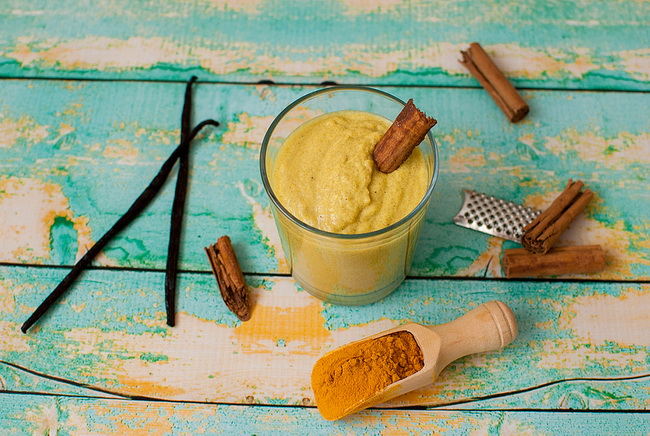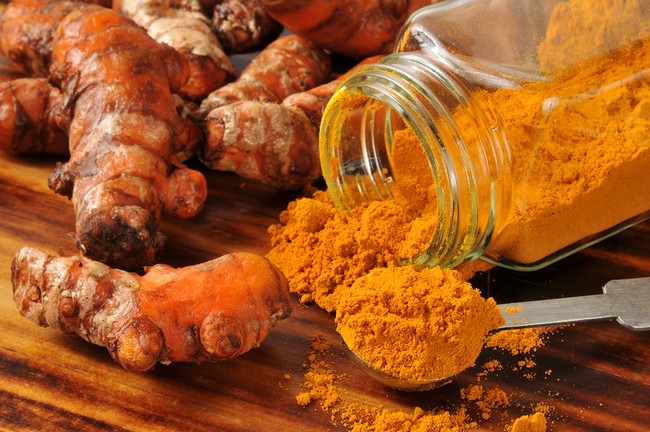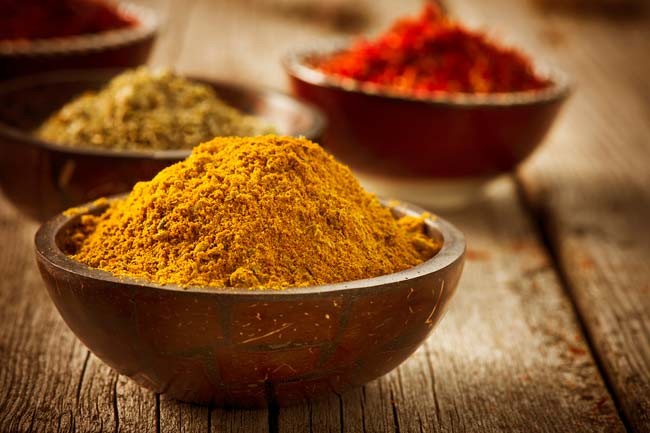- Make It Yourself Lavender Heart-Shaped Bath Bombs!
- 20 Things You Never Knew About “Down There”
- 12 Best Foods For Those Suffering From Arthritis Pain
- 12 Personal Hygiene Mistakes Almost Everyone Makes (Mom Never Told You About #4!)
- 15 Medicinal Plants And Herbs From The Cherokee People
- 12 Mind-Blowing Benefits Of Drinking Coconut Water During Pregnancy
- 12 Outstanding Winter Foods That Won’t Fatten You Up Like A Christmas Turkey
Turmeric: The Most Powerful Medicinal Plant on the Planet

Photo credit: bigstock.com
Surely by now you have heard people talking about turmeric and all the wonderful things it can do. Maybe you have thought, “So what? That’s the stuff in curry powder, right? What’s the big deal?” It’s actually a bigger deal than anyone ever imagined, and scientists are just scratching the surface.
Even though turmeric has been around for thousands of years and has been used in Ayurvedic and ancient Chinese medicine for just as long, westerners and modern medicine is only beginning to catch up to the wonders of this spice. In fact, even if Big Pharmacy never admits that turmeric can prevent or cure anything, there is crystal clear evidence that this spice has amazing medicinal powers. Even Big Pharma cannot deny the proof of more than 4,000 studies! Some scientific research has suggested that turmeric might be helpful for more than 600 different health problems.
Turmeric appears to be super safe as well with almost no side effects other than a very few persons who appear to be allergic to it. Otherwise, there have been no recorded side effects. Big Pharma certainly can never make that claim!
This spice is a close relative of ginger and is typically grown in very much the same way. Although you often find turmeric in a fine, yellow colored powder, the root of the plant is actually a deeper orange color, much like ginger. Most of the turmeric we get today is grown in Pakistan or India, where the root is still used, as it has been for thousands of years, as both a cooking spice, and as a medicine. Although some cultures use the leaves, it’s really the root that is most prized and is most commonly used.
You will sometimes hear turmeric being referred to as Indian Saffron; this is because of the orange/yellow color that turmeric will impart to everything it touches, so it is sometimes used to color cloth and other items, such as food, as well. Turmeric is much less expensive than saffron, so it is often used as substitute colorant.
Continue to Page 2

Photo credit: bigstock.com
Turmeric has such a long standing reputation as a healing spice in the East, and it’s ever gaining popularity in the West, so much that it is now the most commonly consumed supplement in the world.
The active ingredient in turmeric is called curcumin. This very potent, and much studied substance is known to have many health benefits since it is a natural anti-histamine, anti-inflammatory, anti-microbial, and anti-mutagenic.
In addition to its health benefits and food enhancing abilities, turmeric has also long been used by Indian cultures as a means of lightening the skin and giving it a healthy, natural glow. Turmeric is added to some water until a paste is formed and then spread over the skin and allowed to dry. Many of the powders used in cosmetics contain a bit of turmeric for natural coloring.
Perhaps one of the most important things to know about turmeric is how to use it and get the most out of it. Curry powder usually contains very little, if any turmeric, so don’t think that you can simply add an extra half a teaspoon to your food and get the benefits. Also, some turmeric powders contain very little curcumin, which is the actual active ingredient that you want to consume more of. Read the labels very carefully when choosing a turmeric product or even when consuming turmeric supplements. Some turmeric powders have as little as 3 percent curcumin.
Another important thing to know is that the body has a hard time absorbing curcumin. Studies have shown that simple, every day black pepper, when consumed in addition to curcumin, helps improve the absorption rate by as much as 200 percent. So regardless of how you want to consume it, be sure you take a little black pepper along with your turmeric.
Many consider the true power of this spice to be in its anti-cancer compounds. Widely hailed as a true superfood, it has many compounds that strengthen the body and will protect it from various diseases, as well as certain types of cancer. When consumed as a tea, turmeric is known to help stop joint pain, ease digestion, and offer cancer protection. When used as a mouthwash, it can prevent oral diseases such as periodontist and cavities.
No matter how you want to look at it, no matter how you want to consume it, you can’t beat turmeric for its medicinal powers.
This isn’t just talk to sell you something; this spice has plenty of scientific evidence to back up these claims. Below are just a few of the benefits that scientists have learned about through researching this incredibly powerful plant.
Continue to Page 3

Photo credit: bigstock.com
1. Lowers the Risk of Heart Disease
Heart disease is the number one killer in America and one of the biggest killers in the world. Although there are various contributing factors as to how heart disease gets started, curcumin can help stop or reverse some of the steps that lead to heart disease, Curcumin is known to improve the lining of the blood vessels, which will help to regulate blood pressure and blood clotting. One study showed that consuming curcumin was just as effective as exercise in improving blood flow to the heart. Curcumin also reduces oxidation and inflammation in the body, which are also attributed to hear disease. One study used 121 subjects who were about to undergo coronary artery bypass surgery. Subjects received either a placebo or 4 grams of curcumin each day for a few days before and after their surgery. The group that received the curcumin had a 65 percent lower risk of having a heart attack while at the hospital.
2. Stomach Cancer and Ulcers
One study performed in 2002 showed that curcumin inhibits the growth of the helicobacter pylori strains in vitro. It should be noted that this type of bacteria has been linked to the development of ulcers, and later, these ulcers can turn cancerous. A methanol extract of the dried powdered form of the turmeric root was tested against all 19 strains of the H. pylori bacteria and it was shown to inhibit the growth of all 19 strains. This means that consuming curcumin can help to protect you from both stomach ulcers as well as stomach cancer.
3. Fights Against Chronic Disease and Premature Aging
Since curcumin has been shown to have powerful antioxidant compounds, as well as being an anti-inflammatory agent, it only makes sense that it would fight against the development of chronic diseases that often start due to inflammation in the body. Antioxidants stop the premature aging process by killing off free radicals in the body, which harm our tissue on a cellular level.
Continue to Page 4

Photo credit: bigstock.com
4. Prevents and Relieves Arthritis Pain
In studies done with animals, curcumin has been shown to help prevent arthritis and to relieve joint pain for those who already have the disease. This is due to the anti-inflammatory compounds in turmeric. Studies done with rats showed that an extract of turmeric helped to have a positive effect on joint swelling and the reduction of pain in rats that had streptococcal cell wall-induced arthritis.
5. Fights Depression
Curcumin has even been shown to have some amazing benefits when it comes to fighting depression. In one small study, a group of 60 subjects were divided into 3 groups. One group took one gram of curcumin, the second group was given Prozac and the third group received both. After 6 weeks, it was found that the curcumin group had improvements in their depression that were similar to the Prozac group. The group that received both, however, fared the best. This was an extremely small study and more work should be done in this area, but it’s believed that curcumin can boost the levels of certain chemicals in the brain, reversing or improving depression.
6. Protection from Alzheimer’s disease and Dementia
Alzheimer’s disease is the most common form of dementia in the world. Among some of the unique things about this disease are the chronic inflammation of the neurons and the formation of amyloid-B plaque. Curcumin helps the white blood cells in the body fight invading pathogens and can help the body eliminate the formation of these plaques. Curcumin is also known to be highly anti-inflammatory and can pass through the blood/brain barrier, unlike many other substances.
A study done in 2006 used 6 subjects who had been diagnosed with Alzheimer’s disease and gave them curcumin supplements and three other groups of six subjects that received placebo’s or no treatment. The group taking the curcumin showed improved plaque uptake and ingestion. Since amyloid plaques are known to cause oxidative damage to the brain, the free radicals caused by these plaques, can be nullified by the antioxidants in curcumin. Find out the truth about turmeric and Alzheimer’s disease.
7. Improves the Antioxidant Capacity of the Body
In the benefits listed above, you will notice that all of them include the mention of antioxidants. Oxidative damage, in addition to inflammation, is thought to be one of the main underlying causes behind many diseases, as well as the ageing process. This involves free radicals, which are highly reactive molecules with unpaired electrons. Free radicals react to, and damage, organic substances such as proteins, fatty acids, and DNA. Once DNA is damaged, cancer is usually sure to follow. Antioxidants, then, become extremely important since they protect the body from free radicals and kill them. The curcumin in turmeric is one of the most powerful antioxidants in Mother Nature. However, as if this weren’t wonderful enough, curcumin actually boosts the activity of your body’s own antioxidant enzymes. Think of this as a one two punch, fighting back and breaking down free radicals.
Continue to Page 5

Photo credit: bigstock.com
8. Potent Anti-Inflammatory
As we mentioned above, oxidative stress and chronic inflammation are thought to be behind most, if not all, chronic diseases and aging in the body. Acute inflammation (a temporary state) can be very important when it comes to helping the body recognize foreign invaders and damage that has happened so the immune system will respond to make repairs.
However, chronic, or on-going, inflammation plays a part in almost every disease you can think of; heart disease, Alzheimer’s disease, heart disease, arthritis, metabolic syndrome, and heart disease. Therefore, anything that will fight chronic inflammation is a good thing. The curcumin in turmeric is highly anti-inflammatory. In fact, it is so powerful that it actually matches the effectiveness of some prescription and over the counter anti-inflammatory drugs. Curcumin blocks a molecule that turns on genes related to inflammation.
9. Protection from Various Types of Cancer
Research submitted in 2012 showed that curcumin was a potent arresting agent of esophageal cancer. Although current research did not show that curcumin actually stopped the cancer from forming, it did show that it greatly slowed down its progress and development through a mediated Notch signaling pathway.
In addition to cancer of the esophagus, research has also shown that this powerful little root can play a protective role when it comes to fighting prostate cancer. A study done in 2012 showed that curcumin arrests the metastasis of prostate cancer cells in vivo by stopping the expression of CXCL1 and CXL2 cytokines. This same type of inhibitory process also resulted in the diminished capacity of the metastasis of breast cancer cells.
SEE ALSO: 31 Ways Turmeric Protects Against Chemicals
10. Improved Brain Function
One of the most interesting things about curcumin is that it can get past the blood/brain barrier and work in the brain. Very few other substances in this world, including most pharmaceutical drugs, are able to do this. Your brain has a fascinating process by which it can form new connections and even multiply and increase its number of functioning neurons. One of the main drivers of this process is called Brain Derived Neurotrophic Factor, or BDNF. This is a type of growth hormone that functions within the brain itself. Many common brain disorders, including depression and dementia, have been linked to decreased levels of this important hormone. The curcumin in turmeric can increase the levels of BDNF in the brain, delaying or even reversing many age related and other types of brain disease or dysfunction of the brain. Increasing this vital hormone can also improve memory and cognitive function, making you smarter.
This is just a small list of the health benefits that we know about from this amazing spice. In Ayurvedic medicine, curcumin has been used for the following:
- Liver diseases
- Cystic fibrosis
- Inflammation
- Hemorrhoids
- Atherosclerosis
Although turmeric has been shown to have side effects only in those who appear to be allergic to it, if you are consuming any prescription drugs, if you are pregnant, or if you are under a doctor’s care for any type of health condition, be safe and consult your physician before consuming turmeric or curcumin supplements.
References:






























Ellis Drewery
Aug 3, 2015 at 1:05 pm
I have been taking turmeric for a couple of years now….and I don’t see all the wonderful benefits attributed to this herb. I have had a multitude of inflammatory issues with my ankle, hip and hands. I take celery seed extract, garlic, ginger, tart cherry extract, and turmeric, and still see very little signs that they do very much good. I do not have Rheumatoid Arthritis, just the maladies of aging in my joints. In comparing the day to day maintenance use of herbals against the benefit that can be derived from just one prescription tablet for inflammation, it is easy to see how detractors might disparage the use of natural remedies.
ce373
Aug 10, 2015 at 4:04 pm
Have you tried Glucosamine Condroitin with MGM? I have been on it since I was 52 and now am 71.5 and Praise the Lord not one ache or pain in my body by taking usually only one pill a day.
Ellis Drewery
Sep 9, 2015 at 4:15 am
Thanks for the suggestion, ce373. Glucosamine and Chondroitin have been included in almost every joint formula in existence for a long time now. MSM is relatively new but, I have taken it also in the past. I am now taking a supplement with collagen, boswellia, white willow bark, ginger, and a host of others. I intend to give it a three month trial before passing judgement.
ce373
Sep 10, 2015 at 2:11 pm
Some experienced people say that if it isn’t working after a year, but some change has been experienced, one probably isn’t taking the right dosage.
Glen
Aug 3, 2015 at 2:54 pm
i take a half a teaspoon with my powdered fiber supplement every day. i`ve seen this article 3 or 4 times now and it never tells us how much of the actual spice is needed to gain the benefits. so the article is really no help. but i guess when you get paid by the word…..